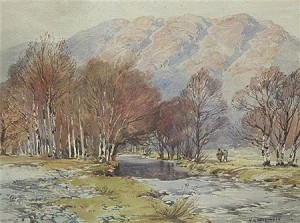
Plymouth, 1er novembre 1845
A M. B. R.
Bien cher frère,
Quelques mots seulement. Je ne réponds pas à ce que vous avez dit sur la 4ème classe de la première résurrection. La chose m’intéresse beaucoup, parce qu’elle se lie à tant de passages et même, de près, à tant de vérités, qu’on devrait l’examiner d’une manière un peu suivie pour pouvoir s’en former un jugement quelconque. Aussitôt que j’aurai pu le faire, je vous en dirai quelque chose. Cela se lie aussi à quelques pensées que j’aie eues sur Apoc.14, mais j’ai un tel sentiment de mon ignorance sur ces points, que ce serait folie d’en dire grand-chose ; il est vrai que cela en rend la recherche d’autant plus intéressante. Je crois seulement qu’il est mauvais de se hâter d’établir un système là-dessus, à cause de la petitesse de nos esprits, au prix de Celui duquel le système, ou plutôt la révélation est sortie. Nous connaissons en partie ; nous recevons (par la foi) des vérités isolées. La liaison de ces vérités provient de l’activité de notre esprit. Je ne dis pas que le Saint-Esprit ne nous aide pas – pourquoi en douterions-nous ? – mais ce n’est plus une révélation proprement dite, et la somme en est toujours incomplète, en sorte que, si nous nous bornons tant soit peu à cela, d’autres vérités sont exclues, perdent leur force, et l’âme et la communion avec les frères (qui peut-être ont appris d’autres vérités) en souffrent. Quant à la traduction, (2e édition de la Version dite de Lausanne) je travaille loin de la plupart de mes ressources en fait de livres, de sorte que je présente mes notes que comme pouvant servir à l’utilité commune, et, dans cette œuvre, il s’agit évidemment de cela. Je reconnais, dans cette traduction (celle qui existe), un travail consciencieux, mais l’examen suivi que j’en ai fait m’a convaincu qu’elle est parfois un peu moins littérale qu’on ne le pensait. Voici ce que j’ai fait dernièrement dans un travail que j’avais entrepris sur le Nouveau Testament anglais : au commencement, je n’avais pas pensé à des améliorations critiques du texte reçu. Etant en voyage (car je n’y travaillais qu’à des moments de loisir), j’avais mon Tischendorf comme livre de voyage. Maintenant, je me suis un peu arrêté à ceci : j’ai une édition avec le texte de Scholz et, dans la marge, le texte reçu, celui de Griesbach, Scholz et Tischendorf. S’il y a accord entre eux, et que les témoins démontrent d’une manière peu équivoque le vrai texte, je l’accepte. S’il y a une variante de quelque importance, appuyée par un bon nombre de témoins, je mets, dans la marge, “plusieurs” ou “quelques-uns” lisent telle ou telle chose. Je ne touche pas la question, quand cela devient une affaire de critique, parce qu’il s’agit d’une traduction et non pas d’une édition critique. Si tous ceux qui ont examiné le texte sont d’accord, c’est une folie de donner une mauvaise leçon. Dans le cas où il y a un grand nombre d’autorité pour une chose, je puis raconter historiquement que ce fait existe, mais je n’entre pas dans le domaine critique proprement dit. J’en profite, mais je ne l’entame pas ; ce n’est pas là ma besogne.
J’enverrai demain, je le pense, les notes sur Matthieu ; les autres suivront de près, Dieu aidant. Les remarques sur les épîtres seront tout autrement importantes. J’ai suivi la marche des traductions dans mes notes.
Quant au passage d’Apoc.5 v.9-10, le texte est bien embrouillé, tellement, qu’on ne doit pas beaucoup insister doctrinalement sur ce qui tient aux variantes dans ce passage. Scholz lit : nous au v.9. Griesbach aussi ; le seul manuscrit ancien de l’Apocalypse le rejette. Au v.10, Scholz et Griesbach lisent …, (mot grec) (“Tu les as faits rois, etc.”) avec la grande majorité des témoins. Scholz et Griesbach retiennent …(rois). A Copt., Vulg. sont les autorités pour ….. (mot grec) (royaume). Il y a presque autant de témoins, plus même, pour “ils régneront”, que pour “ils règnent”, mais le seul ancien ms. cité favorise la dernière leçon…
Il reste une question sur les quatre êtres vivants, que vous n’avez pas encore entamée. Sont-ce des symboles d’un certain caractère de puissance, laquelle se trouve manifestée dans le service de certains êtres qui ne sont pas nécessairement toujours les mêmes ? Qu’est-ce qu’un séraphin ? Il ne se trouve qu’en Es.6, sauf le serpent d’airain. Je doute un peu de votre doctrine de la sacrificature. Il faut premièrement démontrer qu’il y en ait une qui ne soit pas du caractère de celle de Melchisédec. “Ils régneront sur la terre,” ne signifie pas le siège de la souveraineté, mais son objet.
J’ai été interrompu et je m’arrête. Paix vous soit, cher frère. Que Dieu daigne garder les frères dans la simplicité et dans l’humilité, et que leurs cœurs soient unis. Qu’il les fasse prospérer par le souffle de son Esprit. Saluez nos chers amis très affectueusement de ma part. Que la présence de Dieu en Esprit soit au milieu de vous tous ; c’est là notre joie. La seule chose qui m’ait fait de la peine dans la brochure Herzog (Brochure hostile à l’écrivain de la lettre), c’est que c’est un frère ; sauf cela, il y avait seulement à n’en pas tenir compte.
Votre tout affectionné.

 ness of God has placed us before Him in the light. We should now walk in the light, even though we are weak, are tempted and too often stumble. We should maintain communion with God, glorifying Him. Once we were in darkness; now with the Lord we are in the light.
ness of God has placed us before Him in the light. We should now walk in the light, even though we are weak, are tempted and too often stumble. We should maintain communion with God, glorifying Him. Once we were in darkness; now with the Lord we are in the light.

